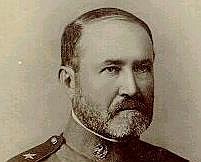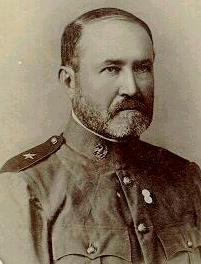A story in the July 1, 1928, Chattanooga Times included this remembrance in its introductory paragraph: "What memories of military panoply, of the glory and tragedy of armed conflict, of service for country and of patriotism aflame can be recalled by the older and later generations of our citizenry. For Chattanooga, since its infancy has been a theater of war; the scene in the [18]60s of mighty battles and, later, with Chickamauga National Park, at our doors, of military preparation, a spot where Mars donned his armor for battle."
As Chattanooga prepares for the commemoration of Memorial Day almost 100 later, few citizens may be aware of the city's military history.
Chattanoogans awoke on the morning of Feb. 18, 1898, to the news that the battleship Maine had been bombed in the Havana harbor, with more than 250 casualties. Within hours, the explosion was blamed on Spanish forces. By April 18, when a joint session of Congress declared war on Spain, preparations had already begun for Chickamauga to be designated as a concentration point for training soldiers.
The 25th Infantry, a regiment of Negro soldiers commanded by Col. Burt, arrived on April 14 to the cheers of more than 500 people awaiting their arrival at Union Station. Within days, six regiments of cavalry had been ordered to Chickamauga, and, by April 20, the city erupted in the "pomp and circumstance of war" as Gen. H.V. Boynton, Gen. A.P. Stewart, Maj. Watkins and others greeted the arriving command staff led by Major Gen. J.R. Brooks.
A local emergency company was formed by Champe S. Andrews and Charles T. Craine while the 2nd Battalion of Chattanooga organized with "lightning speed," with J.P. Fyffe, major, commanding. Chattanoogans C.T. Brown and E A. Turner were named lieutenants, with G. Manning Ellis, surgeon, and H.V. Stevens, R.J. Arnold, C.S. Steward, George W. Brown, S.P. McIntyre and F.H. Phillips chosen as company commanders. The troops immediately went into camp at Driving Park [now Warner Park].
IF YOU GO
The Chattanooga Area Veterans Council is hosting a Memorial Day service on Monday at 11 a.m. at the National Guard Armory, 1801 S. Holtzclaw Ave.The event is free and open to the public.
One recollection from the time mentioned that the troops were "proud soldiers in their blue uniforms and perhaps some of them ... strutted just a bit, at least, when the girls came out to see them in all their glory." More and more regulars began arriving, commencing training with the "Hotchkiss rapid-firing gun, regarded as a 'wow' of a weapon."
In May 1898, more than 50,000 volunteers were ordered to the park and, as they began arriving, the landscape surrounding the park quickly changed. The military bustle was joined by small merchants who set up shop on the outskirts. "Loveman and Miller Brothers had stores down there, and there was a golden harvest for the dealers on pay days." In addition to the booming business community, reports to Washington noted that there were regular parades and regimental reviews, each with the community invited, and one report mentioned that there were "nattily uniformed officers ... to break susceptible feminine hearts before the soldiers left to fight." A May "sham battle" drill witnessed more than 18,000 men on the field.
Among the troops assembled at the park were men easily recognized from previous service. Notables included Gen. Fitzhugh Lee, Maj. Gen. Joseph H. Wheeler, Col. John Jacob Astor, Maj. Gen. J.C. Breckinridge, Maj. Gen. J.H. Wilson, Gen. O.O. Howard and Lt. Col. G.W. Goethals. It was not uncommon for the governor of a state with troops posted at Chickamauga to arrive in Chattanooga and be escorted to the park. The press took note that Col. Milton Grigsby's Rough Riders were training at the park; Teddy Roosevelt's own Rough Riders would later overshadow Grigsby's men.
Training for military combat apparently did not keep the city or the nearby troops from enjoying Chattanooga's annual Spring Festival. Gen. Brooks sent a regiment to the festivities to "add martial color," and they were greeted by Grand Marshall W.J. Bass, who crowned Capt. C.S. Andrews as "Baldur." Miss Margaret Sharp (later Mrs. R. Williams) was named the Spring Festival queen while hundreds of festival attendees celebrated.
Gen. Fred Grant, son of the Civil War Union commander who had made Chattanooga his headquarters, was based at Chickamauga, living in a tent. He was, however, a frequent guest of Chattanooga's most prestigious families and, on July 4, 1898, was asked to assist as the city celebrated the nation's independence by reading aloud the Declaration of Independence. Joining him on the platform were Chattanooga's mayor, Ed Watkins, along with other elected officials.
By August, the Spanish-American War had ended, and the "volunteers obtained nothing from the war except camp experiences." Some regulars had been sent south, but most "got no nearer to Cuba than northern Georgia." The final review of troops, Aug. 17, was witnessed by more than 5,000 people from Snodgrass Hill and Dyer Field.
Within weeks, the camp was emptied, and an episode in Chattanooga's military history had ended.
Linda Moss-Mines is the Chattanooga-Hamilton County historian, secretary of the Chattanooga Area Veterans Council, and regent, Chief John Ross Chapter, NSDAR.

